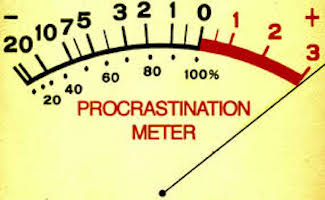 Abraham Lincoln once said, ““You cannot escape the responsibility of tomorrow by evading it today,” yet procrastination is still one of the most common roadblocks to success.
Abraham Lincoln once said, ““You cannot escape the responsibility of tomorrow by evading it today,” yet procrastination is still one of the most common roadblocks to success.
It is the enemy of results and causes untold sleepless nights. Even if you start strongly, a failure to finish is always just that, a failure. We all know that procrastination is harmful, and no one really enjoys doing it. So why does one (ironically) persist with procrastination?
We generally embark upon a plan or project with grant ambitions. Then, part way through, something insignificant can grab your attention and fritter your energy – either a tv show, a cupboard which desperately needs cleaning or a mate who needs a favour. Then, shortly after, the self-loathing begins – ‘why can’t I stick to anything? I’m not clever/disciplined/organised enough, everyone was right – this will never work…’
When you procrastinate, you might feel better on the short-term, but you will suffer in the long-term. And procrastination has a price.
Psychologists have even compared procrastination to alcohol and drug abuse (behaviourally), and found that it is related to:
- Depression
- Irrational beliefs
- Low self-esteem
- Anxiety
- Stress
The study by Dianne Tice and Roy Baumeister says, “The present evidence suggests that procrastinators enjoy themselves rather than working at assigned tasks, until the rising pressure of imminent deadlines forces them to get to work. In this view, procrastination may derive from a lack of self-regulation.”
A fear of the unknown is almost universal – stepping out of one’s comfort zone, is, be definition, uncomfortable. It takes courage to make a bold move. But it sure doesn’t take any courage to complete small tasks like paying bills, doing taxes, or returning phone calls.
Procrastination starts when you give into one distraction and give up being productive. “I’ll just check social media/the news/my phone for a second.” Next thing you know, you’re three episodes into some obscure show on Netflix!
To change this habit, realise that willpower doesn’t work, but systems so. If you want to get things done, you need rules.
The following have been found to be effective, in combination:
- Self-imposed deadlines.
- Accountability systems (commitment with friends, or a coach).
- Working/studying in intervals.
- Exercising 30 minutes a day.
- A healthy diet.
- Eliminating distractions.
- Internal motivation.
Deadlines create urgency, accountability creates responsibility, working in intervals improves your focus, exercise and diet improves your energy, and eliminating distractions takes away the temptations.
Then, to create an inner drive, answer the following: why are you doing what you’re doing? You need to answer this – it will give you a purpose and a ‘big picture’ to work to.
Instead of diving into work, take a step back, reflect, and create a system that supports what you want to achieve.









Join the Discussion
Type out your comment here:
You must be logged in to post a comment.